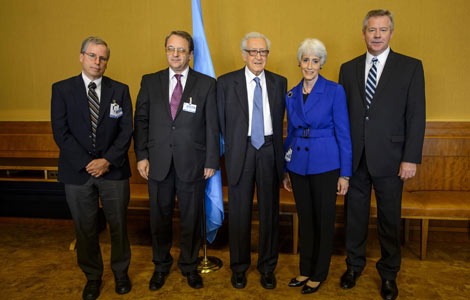Russia, US disagree plan for Syria talks
Updated: 2013-06-26 06:17
(Agencies)
|
|||||||||||
|
 |
|
U.S. ambassador to Syria Robert Ford, Russia Deputy Minister for Foreign Affairs Mikhail Bogdanov, U.N.-Arab League envoy for Syria Lakhdar Brahimi, U.S. Under Secretary of State for Political Affairs Wendy Sherman and Deputy Minister for Foreign Affairs Gennady Gatilov pose for photographers before a meeting on Syria at the United Nations European headquarters in Geneva June 25, 2013. [Photo/Agencies] |
BEIRUT/GENEVA - Talks between the United States and Russia to set up a Syrian peace conference produced no deal on Tuesday, with the powers on either side of the two-year civil war failing to agree when it should be held or who would be invited.
Saudi Foreign Minister Prince Saud al-Faisal accused the Syrian government of "genocide" and described the involvement in the conflict of foreign militias backed by Iran as "the most dangerous development".
Washington and Moscow announced plans for the peace conference last month, but their relations have since deteriorated rapidly, as momentum on the battlefield has swung in favour of President Bashar al-Assad.
Washington decided this month to supply military aid to the rebels fighting Assad, while Moscow refused to drop its support for the Syrian leader it has continued to arm.
After five hours of talks in Geneva sponsored by the United Nations, Russian Deputy Foreign Minister Gennady Gatilov said there was still no consensus on a role for Assad's ally Tehran, or on who would represent the Syrian opposition.
"There is a disagreement on whether or not, for example, Iran should take part. From our point of view, Iran's participation in the conference is necessary because it can play an important role as a country of the region," he told reporters.
Washington has opposed including Iran in the talks amid continuing disagreement about its disputed nuclear programme.
Gatilov added that Russia wanted the opposition delegation to represent all the main groups, without saying which he meant.
With such issues unresolved, the conference is not expected now to be held before August or even September.
The United States and Western European powers have joined Arab countries and Turkey in supporting the mainly Sunni Muslim rebels. Russia and Iran support Assad, who has made gains in recent weeks with the help of thousands of fighters from the Iranian-backed Lebanese Shi'ite militia Hezbollah.
U.S. Secretary of State John Kerry and Russian Foreign Minister Sergei Lavrov will meet next week, and further talks on the conference are expected to follow, a U.N. statement said.
In Damascus, Assad's forces fired mortars and shells at Zamalka and Irbin, just east of the government-held city centre, in an assault backed by air strikes, opposition activists said.
Rebels who grabbed footholds in Damascus nearly a year ago say they now face an advancing Syrian military buoyed by support from Hezbollah.
A double-edged attack
In Jeddah, Prince Saud repeated Saudi Arabia's call for the rebels to be armed. "Syria is facing a double-edged attack. It is facing genocide by the government and an invasion from outside the government," he told a news conference with Kerry. "(It) is facing a massive flow of weapons to aid and abet that invasion and that genocide. This must end."
The Saudi foreign minister attacked Iranian involvement. "The most dangerous development is the foreign participation, represented by Hezbollah and other militias supported by the forces of the Iranian Revolutionary Guard," he said.
Saudi Arabia, a Sunni state which views Shi'ite Iran as its arch-rival, has increased aid to Syrian rebels in recent months, supplying anti-aircraft missiles among other weapons.
Security in Syria's neighbours Iraq and Lebanon, where the conflict has aggravated Sunni-Shi'ite tensions, has crumbled.
Suicide bombers killed eight people north of Baghdad on Tuesday, a day after 39 people died when 10 car bombs exploded in the capital. Violence has spiralled in Iraq since April.
"Getting our of hand"
In Lebanon, clashes between the Lebanese army and gunmen led by an anti-Hezbollah Sunni cleric engulfed the southern port of Sidon on Sunday and Monday. At least 40 people were killed, including 18 soldiers, security sources said.
Sectarian hatred has even flared in Sunni-majority Egypt, where a crowd attacked and killed five Shi'ites on Sunday.
Lakhdar Brahimi, the U.N.-Arab League mediator who chaired the Geneva talks, urged the United States and Russia to help "contain this situation that is getting out of hand, not only in Syria but also in the region".
Speaking before the meeting, Brahimi said he doubted that the Syria peace conference could take place next month, citing disarray among Assad's political opponents.
More than 93,000 people have been killed in Syria since peaceful protests erupted in March 2011. The civil war has driven nearly 1.7 million refugees into neighbouring countries.
Outgunned rebels are looking to Western and Arab nations to help them to reverse Assad's gains. But although the United States announced unspecified military aid this month, it is unclear whether this can shift the balance against the Syrian leader and his allies.
Kerry wants to ensure aid to the rebels is properly coordinated, partly out of concern that weapons could end up in the hands of Islamist militants who are prominent in their ranks. "Our goal is very clear, we cannot let this be a wider war, we cannot let this contribute to more bloodshed and prolongation of the agony of the people of Syria," he said.
Today's Top News
Xi: Public interests Party's top priority
China rejects US' claim on Snowden
Cooling off, the traditional way
Patchwork solutions for winter ills in summer
Warning on college majors
Yangtze Delta region braces heavy rains
Surviving climber safe at home
PBOC will act 'if necessary'
Hot Topics
Lunar probe , China growth forecasts, Emission rules get tougher, China seen through 'colored lens', International board,
Editor's Picks

|

|

|

|

|

|





